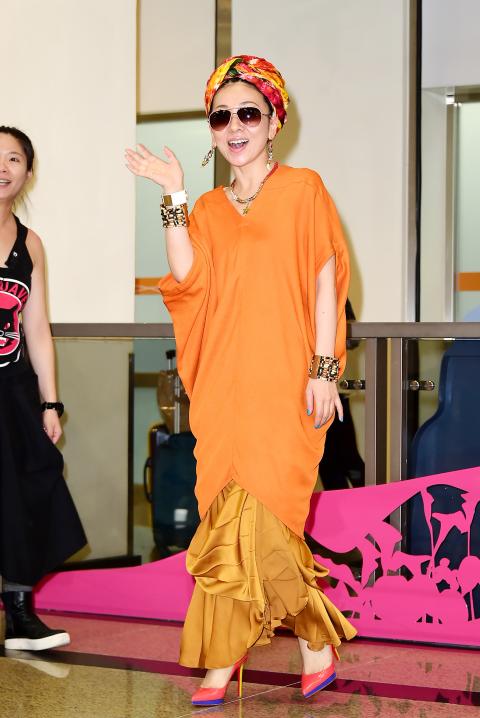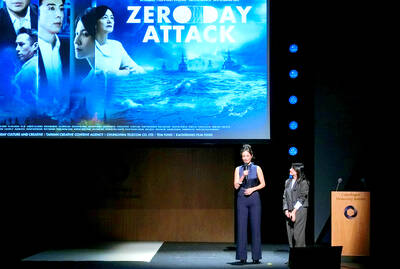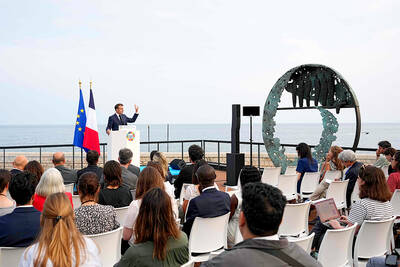Singer 2020, the eighth season of the hit singing competition, attracted much attention by inviting Japanese pop singer Misia to compete. The other six starting contestants for this season include Taiwan’s Jam Hsiao, a co-host of the show, LaLa Hsu, and China’s Hua Chenyu, Tia Ray, Mao Buyi and Zhou Shen.
Due to the COVID-19 outbreak, the reality TV show premiere had been repeatedly postponed, before finally being broadcast on Feb. 7. In order to avoid home quarantine, all the singers have recorded their weekly performances separately in five different locations — Beijing, Shanghai, Changsha, Taipei and Tokyo — without a live studio audience since Episode 3, while a 500-member audience watches the live stream from home and then casts its votes via an app.
In Episode 3, Misia performed her 2011 classic Ashita E, literally Toward Tomorrow, at a Japanese venue where 10,000 candles were lit up to cheer those fighting the epidemic. The 42-year-old singer was voted No. 1, as her heartfelt performance in Japanese successfully crossed the language barrier.

Photo: Hu Shun-hsiang, Liberty Times
照片︰自由時報記者胡舜翔
(Eddy Chang, Taipei Times)
熱門歌唱競賽《歌手》系列已進入第八季,《歌手2020》因邀請日本流行天后米希亞參賽引發廣大關注。本季另外六位首發參賽者包括︰兼任主持人的台灣歌手蕭敬騰、徐佳瑩,及中國歌手華晨宇、袁婭維、毛不易、周深。
受新冠肺炎爆發影響,該實境節目屢次延期,最終在二月七日開播。為避免遭到居家隔離,所有歌手自第三集起,每週分別在北京、上海、長沙、台北、東京五個不同的地點錄製表演,現場觀眾也全部取消,改由五百名觀眾於線上觀看後,透過手機APP進行投票。
第三集節目中,米希亞演唱了她二○一一年的經典《向著明天》,在日本的演出現場還點起一萬支蠟燭,為和肺炎疫情奮戰的人們打氣。這位四十二歲歌手真誠的日語演唱成功跨越語言障礙,更在當晚奪下第一名。
(台北時報張聖恩〉

Some 400 kilometers above the Earth’s surface, the “International Space Station” (ISS) operates as both a home and office for astronauts living and working in space. Astronauts typically stay aboard the station for up to six months and engage in groundbreaking research projects in various fields, such as biology, physics and astronomy. These projects help scientists understand life in space and contribute to advancements that benefit people on Earth. The ISS has experienced significant growth since construction began in 1998. The station’s design and assembly represent an extraordinary international collaboration among Canada, the European Union, Japan, Russia and the United States.

A: While hit musical Les Miserables’ concert tour kicks off, South Korean drama Squid Game 3 will be back at the end of this month. B: New Taiwanese dramas The World Between Us 2 and Zero Day Attack have also gained attention. A: I heard that Zero Day Attack is a story about the Chinese Communist Party’s People’s Liberation Army trying to attack Taiwan by force. B: The drama’s subject is so sensitive that it has sparked a lot of controversy in society. A: I just hope that such a horrible story will never happen in

The UN Ocean Conference wrapped up in Nice, France on Friday last week with world leaders taking major steps toward marine protection and vowing a showdown when nations meet to negotiate rules for deep-sea mining next month. But a lack of funding pledges and the total omission of fossil fuels disappointed some observers. The summit was just the third — and largest yet — dedicated entirely to what the United Nations calls an “emergency” in the world’s oceans. The High Seas Treaty, or Global Ocean Treaty, is also known as the Agreement under the United Nations Convention on the Law

Continued from yesterday(延續自昨日) https://www.taipeitimes.com/News/lang Living on the ISS is challenging due to the absence of gravity. Astronauts must strap themselves into sleeping bags to prevent floating away while they sleep. They also spend about two hours exercising daily using specialized equipment. Despite this, microgravity can cause muscle loss, bone density reduction and cardiovascular changes. As a result, astronauts require extensive rehabilitation upon their return to Earth. In spite of these difficulties, astronauts often describe their experience on the ISS as life-changing. One of the most awe-inspiring aspects of living aboard the space station is the unparalleled view of Earth. Traveling at